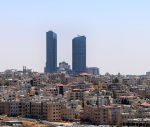You are here
Jordan and Jordanians deserve a pat on the back
Mar 30,2019 - Last updated at Mar 30,2019
Decades ago, I was privileged to travel with Jordan’s negotiating team to the Arab-Israeli peace talks in Washington, DC, initially and then to multiple locations in the area. For at least two or three years in the early 1990s, my primary job was to report on the very complex and detailed talks seeking to achieve a solid formula for the settlement of conflict between Arab states and Israel that would also guarantee the inalienable rights of the Palestinians.
As I now look back at that time, it is almost impossible to explain or even comprehend how the mood of rising hope and certainty in the promise of a better future for the Palestinians, as well as the Arab and Israeli peoples, could have logically degenerated into the political and security mess we see today.
It is really difficult to grasp how the brave political commitment of those days, from all sides of the formula, has become almost a spoof or satire, mocking the leaders and the people of that time who actually dared believe that we could negotiate and transcend our political conflict and invest instead in all of our humanity.
And without sounding naïve or ignoring the hard politics of the world today, I am becoming more convinced that the downward spiral from that moment of hope is largely due to the lack of global and, dare I say it, regional leadership that understands the value of moral and ethical international relations, even when pursuing narrow national interests.
What we seem to be missing today is the balance between pragmatic self-serving policies on the one hand, with at least a pinch of idealistic morality on the other, to ensure that while in the pursuit of our own separate paths, we all do not abandon the Palestinian people to endless human suffering and socioeconomic and political obliteration.
So much commentary today blames and is focused on the skewed global leadership of US President Donald Trump’s administration that is accused of adopting the family business model, where interest is driven by the perceived benefits to the immediate family and friends, without any sense of community responsibility or ethical grounding. US policies are seen to be driven mostly by President Trump’s narrow personal political interests, and in the case of the Palestinians, by his son-in-law’s religious ideology.
To many people of the world, and certainly to the Arab Muslim world, this has meant that the US cannot believably and credibly project itself as the owner of the moral values expected from it as a unitary superpower. The US today has little to support its previously held position as an, at least nominally, unbiased superpower that can legitimately be trusted to act as an honest broker of peace especially in the Middle East.
In pushing forward a foreign policy focused only on serving the expansionist interests of Israel, a foreign state internationally labelled and documented as a ruthless occupier in breach of all human rights standards, the US move cannot be seen as anything but an intentional decision to unilaterally call off all efforts towards reviving Middle East peace negotiations, and using its superpower to enforce an un-negotiated settlement to the Arab-Israeli conflict, which falls squarely in favour of Israel.
But that does not tell the whole story either. The absence of a moral focus and ethical leadership has not been the remit of the US alone. The Arab world has also lost its compass and has allowed itself to be dragged, willingly I am sad to add, into polarisation, narrow self-interest, inhumanity and, with it, immorality.
And yes, I will buy into the argument that the “superpowers” colluded with Israel to purposely design the state of instability and even war in our region in order to distract us from our root grievances in Palestine. But that admission does not remove the following questions: Where has our collective Arab will manifested itself against those plans? In fact, where has our collective Arab voice disappeared to? Where is the authentic voice of Arab leadership and what is the historical legacy that we left to generations beyond us of our contribution to their future?
And this leads me to Jordan’s position today and the efforts of our Jordanian leadership to rally support for a collective Arab voice to refocus attention on the very worrying turn of events with regards to Israeli-occupied Arab territories in Palestine and Syria.
The shuttle diplomacy of His Majesty King Abdullah, which appears to be aimed at re-centring the policies and diplomacy of Arab — and even European and international — leaders around the Palestinian issue and the humanity of Arabs, both Muslim and Christian, should be recognised for what it signifies: a pragmatic effort to safeguard Jordan’s interests of course, but also a rare moral position in an otherwise morally disrupted and disruptive region and world.
It remains the most pragmatic yet moral political stance, not only with its resolve to safeguard the Palestinians living under occupation and the historical integrity of Arab land, but also one that stays firmly in favour of a peaceful and negotiated resolution to the Arab-Israeli conflict while respecting the rights of all parties, including those of Israelis.
And herein lies the critical point: The constant and underhanded attack on what I am going to call the “Palestinian depth” to the Hashemite Kingdom of Jordan and its leadership, must, in my opinion, also be recognised for what it really is: an attempt to subvert a rare voice of reason and to unsettle the stability of one of the few remaining Arab states hanging on to its borders, its security, its political legitimacy with its people and its credibility beyond its borders.
As the times get more difficult to decipher and the details increasingly blur the core issue, as more difficult economic realities and pressing citizen needs trump the ability of states to maintain any reasonable moral high ground in the face of superpower, international and regional, dictates and pressures, it would only be historically fair to recognise that Jordan has created a moral ground it can be proud of.
While always keeping the Palestine issue alive, and while playing host to millions of refugees from neighbouring Arab states, Jordan has also been able to produce a state model that combines support for international diplomacy, with pragmatic and inclusive regional leadership, as well as an acute sense of national duty and responsibility.
In pursuing that model, which, by the way, is the secret to our continued stability, we came together both as a leadership and a people, oftentimes ignoring all the stressors and even the rising feelings of frustration. For all of that, it is perhaps time we recognised we all deserve a pat on the back.













